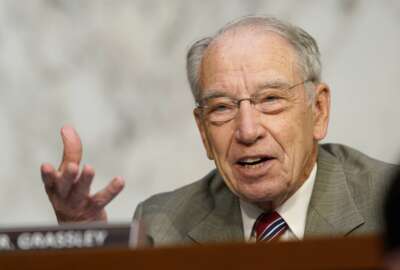Hubbard Radio Washington DC, LLC. All rights reserved. This website is not intended for users located within the European Economic Area.
Veteran-owned businesses question fairness of VA’s contractor verification
The process to ensure veterans are receiving contracts from the VA is actually shutting out some veteran business owners. But the VA says it inherited a lar...
In the late 1990s, Lisa Wolford was a single mother of two, figuring out how to support her family. To help make ends meet, Wolford developed a business plan she had put together in college and formed the IT services company CSSS.net in Nebraska.
Wolford started working with the private sector on software development and network support. A few years later she had won contracts with federal agencies, including the Department of Veterans Affairs.
Wolford served as a radio operator from 1981 to 1985 in the Marine Corps.
“To me, one of the greatest honors you can have is serving your country, so doing that as a contractor is just another format,” she said.
 |
“There are companies that will go out of business fighting for that long. It’s very, very detrimental.”— Lisa Wolford, veteran contractor
|
But a ramped-up process at VA to prove veteran status has cost Wolford “a couple hundred thousand dollars” in legal fees and nearly a year trying to prove she is in fact the owner of her company. In those 11 months she spent fighting the VA, Wolford was barred from bidding on any VA contracts.
“There are companies that will go out of business fighting for that long,” Wolford said. “It’s very, very detrimental.”
VA is the only agency that verifies veteran status and ownership before awarding vet-owned business contracts. But the process has been riddled with accusations of inconsistencies, slowness and incompetence, according to some veteran-owned businesses.
VA removed 8,000 businesses from its veteran-owned contractor database after more stringent verification rules went into effect in 2010, according to testimony in a congressional hearing in February.
VA officials acknowledge the problems and frustration of some veterans, but also say the process is getting better.
The agency has gone through “some teething problems, quite frankly,” said Tom Leney, the director of VA’s Office of Small and Disadvantaged Business Utilization.
Leney said the office within OSDBU charged with verification — the Center for Veterans Enterprise — had to evolve in order to fulfill a mission it was not originally structured to do.
“We took an organization [CVE] whose purpose was to help veterans develop, build capacity in their businesses, and turned it into an organization whose primary purpose was to audit the eligibility of firms,” Leney said. “So it was a massive organizational change.”
Service-disabled veteran-owned businesses (SDVOBs) and veteran-owned businesses (VOBs) get special preference in federal contracts, along with other set-aside programs for women-owned and minority-owned companies. Since 1997, Congress mandated agencies award at least 23 percent of those contracts to small, disadvantaged businesses — including 3 percent for SDVOBs. VA’s agency-specific goal for SDVOBs is 7 percent.
And since 2006, VA has given top priority to SDVOBs and VOBs over other kinds of preference programs, part of the Veterans Benefits, Health Care, and Information Technology Act. The prioritization led to VA’s creation of a verification process.
Except for VA, all agencies rely on a “self-policing” process for SDVOBs and VOBs, said Ken Dodds, the director of the Office of Government Contracting at the Small Business Administration. Dodds said SBA looks for “red flags” based on another contract bidder’s protest.
Because VA’s verification program is unique to the government, it could serve as a model for other agencies. But some veterans point to problems they say need to be fixed first, like long waits, lack of communication and inconsistent applications of the rules.
VA’s verification program always has been a balance between increasing veterans’ access to government contracts while ensuring fraudulent players aren’t awarded federal funds, said Scott Denniston, the director of VA’s Office of Small and Disadvantaged Business Utilization from 1987 to 2009.
“The pendulum swings,” Denniston said. “First, it’s people saying VA is too liberal and letting in frauds and fronts. Then you swing to the other side where they’re keeping out legitimate veteran owners.”
In 2010, VA’s verification process came under “much more scrutiny,” said Denniston, who by then had retired from VA. The increased scrutiny followed a 2009 report from the Government Accountability Office on the potential of fraud in the SDVOB and VOB programs.
Scrutiny came in the form of a new regulation, published in December 2010. The regulation stated that firms registered in the database but not verified had to submit their documents within 90 days after receiving a notice from VA. Also, firms that had registered after Oct. 13, 2010, would not even be publicly viewable on VetBiz, according to a VA fact sheet.
“If you did not send in the paperwork, you’re off the database,” said Bob Hesser, co-chairman of the VET-Force Task Force.
The pendulum had swung toward clamping down on fraud.
“The problem is, the scrutiny VA is putting people under, many veterans think is burdensome and really is an intrusion to the way they do business,” Denniston said.
 |
“The pendulum swings. First, it’s people saying VA is too liberal and letting in frauds and fronts. Then you swing to the other side where they’re keeping out legitimate veteran owners.”— Scott Denniston, former VA OSDBU
|
Wolford: VA ‘shooting from the hip’
In February 2011, Wolford submitted documents to VA to show she was indeed qualified to have preferential status when bidding for VA contracts. But in August, she checked the online VA database — VetBiz VIP — and discovered VA had removed her from the database.
Wolford said she didn’t know what the problem could be. She had sent her documents three different ways: uploaded onto the VA website, plus she sent hard copies and a CD of the documents through certified mail.
It wasn’t until Wolford called VA that the agency sent her a letter of denial.
The letter said Wolford had shown she was a service-disabled veteran and was indeed the owner of the company.
However, CVE staff said they couldn’t confirm Wolford had control over the company and ran its day- to-day operations full-time.
The problem lay in a living trust that Wolford had submitted as part of her application packet. She created the trust to protect her children, including her oldest child who has multiple disabilities, she said. But CVE viewed the trust as another business.
“It was clearly something she did for her loved ones,” said Haytham Faraj, Wolford’s attorney.
Wolford appealed VA’s denial. Again, she was denied, but this time for new reasons. Now VA told Wolford that the agency could not determine if Wolford had enough managerial experience.
The reason for the second denial was “mind-boggling,” Faraj said. “She’s doing the very work that they allege she’s not competent to do based on somebody’s conclusions.”
CVE said Wolford had failed to include a resume, when in fact she did, Wolford said. She said it was clear to her that CVE had lost her paperwork. But instead of asking her to explain the trust before the first denial or asking her to resend her resume before the second denial, the agency went ahead with the denials.
“It seems like they’re just shooting from the hip and reacting,” Wolford said of CVE.
Finally, in January, Wolford filed a lawsuit against VA. That got the agency’s attention, and Wolford’s company was re-listed in VA’s database a day later.
“I understand the need for verification to prevent fraud and I completely concur with that,” Wolford said. “The other side of that is [VA] should not be harming valid small businesses, service-disabled veteran-owned businesses, while they’re doing that, which is exactly what they’re doing.”
Wolford said she worries about the young vets returning from Iraq and Afghanistan, wanting to start their own business and work with the VA. They will find it’s “going to be challenging because it’s challenging for me and we’re a strong company,” she said.
Former OSDBU Denniston said when he still was working at VA, the approach was more “streamlined.”
“When you do that, there’s a greater chance that things are going to slip through, but we took the approach that if 99 percent of the people are legitimate, honest business owners, we didn’t want to hold those up to identify that 1 percent. I think that’s where the philosophy has changed a bit,” Denniston said.
Improvements to the process
Leney, the current head of VA’s Office of Small and Disadvantaged Business Utilization, said the verification process is streamlined now — and much more so than it was a year ago.
“We have re-engineered the process. … We put in quality control checks in the process to make sure we get accurate and complete examinations and evaluations,” he said.
Prior to Leney’s arrival in April 2011, CVE had fallen behind in its verifications. CVE had to respond to businesses within 90 days of the company receiving the re-verification notice. As of Jan. 31, 2011, CVE only had verified 6,621 — or 39 percent — of the more than 17,000 businesses in VetBiz, according to a July 2011 report by the Office of Audits and Evaluations in the VA Office of the Inspector General.
 |
“We had to go through some teething problems, quite frankly.”— Tom Leney, VA OSDBU
|
CVE has cut down its time to make a decision, Leney said. The center has gone from 126 days to process an application in June 2011 to a current average of 55 days, he said.
The sped-up process is due to, in part, the ability for business owners to submit all their information online, Leney said.
Applicants also are getting more frequent communication from CVE, and VA’s verification staff now are required to send email communications so there is a “documented audit trail,” Leney said.
Despite the improvements Leney points to, some veterans still feel burned from previous years’ experiences. And vets who want to do business with VA must get verified every year.
“We have individuals, when it came time for the option year, they were not renewed because they weren’t in the VetBiz database. They were not in the VetBiz database because the VA never got around to it or, which is the worst problem — this is one we’re extremely angry about — is that VA unjustly denied someone for some of the most ridiculous, stupid, unbelievable reasons,” said Hesser of the VET-Force Task Force.
Leney acknowledges the frustration felt by some, but added that those initial growing pains are exactly why CVE has invested in resources to improve verification for vets and clarify the requirements.
CVE currently has a staff of 22 full-time employees and an additional 114 contractors, according to VA’s response to emailed questions. In fiscal 2011, CVE’s budget was $13.2 million.
CVE’s biggest goal now is to improve the IT side of its verification case management system. Leney said he expects the new system to be in place by the end of the year.
But technological improvements alone may not be enough. Hesser said training — or the lack of it — is an issue for CVE. What’s more, he said, “The major problem is they waste, waste, waste time on reverification, reverification, reverification.”
Next year, Wolford will go through the verification process again — and, like all vets who want to do business with VA — every year after that if she wants to continue doing business with VA. Her experience last year still leaves a sour taste.
At the same time, she said she will still reapply for reverification and the chance to do business with VA. “Here’s the thing,” she said. “I love the VA’s mission of helping veterans.”
A governmentwide model?
VA’s verification program has the potential to expand to the rest of the government.
A bill passed by the Senate Small Business Committee last year would use VetBiz verification for SDVOBs and VOBs wanting to contract with all federal agencies — not just with VA. The Senate passed the Small Business Contracting Fraud Prevention Act of 2011 or S.633 in September 2011 and the bill now is in the House Small Business Committee.
A subcommittee hearing by the House Oversight and Government Reform Committee in February explored how the rest of government could clamp down on frauds winning contracts that are supposed to go to veterans. In testimony, an official from VA’s Office of the Inspector General said 76 percent of the businesses reviewed by the OIG were ineligible for veteran-owned status.
The two main sources of ineligibility came from two sources — “pass-through” contracts, or bad actors using eligible firms as fronts, and legitimate veteran- owned businesses that didn’t meet the ownership requirement.
This ownership requirement is what’s holding up S.633 — VA and SBA use different definitions when it comes to veteran business owners.
Under SBA’s definition, a veterans must have majority ownership and control over the company. Under VA’s definition, a veteran must have majority ownership but 100 percent control over the day-to-day operations, as well as 100 percent control over the long-term decision-making of the company. That means a veteran who is running a business on the side, in addition to full- time work, would not qualify under VA’s definition.
“There are a lot of different nuances and corporate agreements and LLC’s and how … control can come out, but that’s not something that’s really intuitive or that a veteran would necessarily know when they form an LLC or a corporation,” said Devon Hewitt, an attorney with Protorae Law.
Who would oversee a governmentwide veteran-owned contractor verification system really comes down to two agencies — VA or SBA.
Details of what the bill would cost remain in discussions. “There’s a lot of concern as to how we would fund it and what it would mean for businesses currently,” said a congressional aide working on the legislation.
In Hewitt’s assessment, SBA is better positioned to take on the task. SBA is “experienced in running all these programs for a very long time,” she said.
Another reason some favor SBA is distrust over how VA has run its verification program.
“They’re as bad of an enemy to veterans as anyone,” Hesser said.
Hesser said he thinks if the bill passes, it will do so in a different form from how it was introduced. He added the veterans organizations, including his own, support verfiication.
“We want it to work. We just put our trust in people before and we ain’t going to do it again. … We now want it to be done correctly or we don’t want it done at all,” Hesser said.
If S.633 does pass as it is written now, the responsibility of verifying veteran- owner status would fall into VA’s hands. VA is now determining what it will take to expand its verification governmentwide, Leney said.
“We have an interest in supporting veterans, and enabling veteran businesses to demonstrate they are able to add value of the work of the department. That’s our focus and should the mission be expanded, the VA will be ready, willing and able to handle it,” Leney said.
But Wolford said she’s worried a verification system that is “so dysfunctional” would only disqualify more eligible veteran-owned businesses if expanded.
“It would just be beyond tragic,” she said.
MORE FROM FEDERAL NEWS RADIO
Congress mulls expansion of VA’s system to verify veteran-owned firms
VA, House lawmakers spar over veteran-owned contracting program
VA sets rules for set-aside program
Copyright © 2024 Federal News Network. All rights reserved. This website is not intended for users located within the European Economic Area.
-
Eternal question: What to keep, what to toss out Federal Drive
-
CISA ups the SBOM game Federal Drive




